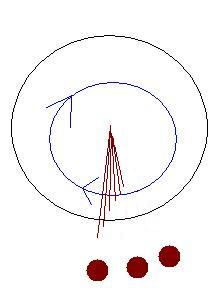If the semantic structure of a language influences the thoughts and ideas of its users and vice versa, then how and to what degree? Over a decade ago John J. Gumperz and Stephen C. Levinson looked at such questions in a work entitled “Rethinking Linguistic Relativity” which examined much earlier works by linguists attempting to explain how thought and language interact. In 2007 and beyond, such research is and will be fundamental to our understanding of things like online Web 2.0 collaborations, artificial intelligence, semantic web applications, internationalization tasks, and just about any other activity that primarily involves communication between people using language. Similarly, some have suggested (e.g. in books like “Thinking in Java” and the like) that ideas and/or thought in software engineering are governed to some degree by the structure and/or semantics of programming languages themselves and that they are not to be compared simply in terms of efficiency or other such criteria.
Knowledge Discovery, Politics, Religion, Philosophy, Systems, Software, Architecture Theory and Practice
ad1
Sunday, December 31, 2006
Thursday, December 21, 2006
AJAX Libs
Check them out and comment on what you think OR
If you already have then comment on your experiences with them ....
Thursday, December 07, 2006
New Web 2.0, AI, etc. Forum
Wednesday, November 29, 2006
True 3D Video Holographic Display

Simple display technologies like that used in the Fantazein Clock and other such novelties, suggest a potential approach for creating genuine three dimensional video. This potential involves the use of the persistence-of-vision effect combined with fiber optics light emitters. These light emitters would be configured in arrays and attached to a central spinning hub. Hundreds of these arrays would be attached to the same hub with each being slightly shorter in length with respect to the central hub than the one adjacent to it in a clockwise or counter clockwise direction. These various lengths would represent 3d layers. More to follow....
Friday, November 24, 2006
Open search indices, Google's Achilles heal?

Open public indices for search , if expanded, could be the start of open-source-like alternatives to Google's global search dominance. With the success of collaborative open web 2.0 phenomena like Wikipedia, can much of the internet content itself be catalogued by public minded groups and individuals so that search might again be an area for innovation and experimentation? Many groups have discussed this topic but attempts at something real have been few and far between.
Could mammoth indexing tasks like the continual web crawling conducted by Google's bots, be accomplished in a distributed manner like peer-to-peer networks or systems that employ approaches like that used by BitTorrent?
Monday, November 20, 2006
Semantics
The study of ant colony behavior has been studied for years in connection with such problems as path optimization but many other similar connections between entomology and computer science exist.
Monday, November 13, 2006
New Software, ProgenitorCE v1.4 - Free Trial

I have released first version of a new software tool we have developed at Concept Explore . I am offering a free trial version, fully functioning, that users can download and use immediately.
This tool can be used by anyone that must create as a matter of course in their work or otherwise.
Check it out now.....
Friday, November 10, 2006
Open Index of Human Knowledge - Up and Running
Site hopes to create an open source repository of searchable indices of public web pages.
Its goal is to provide a free and open version of the types of indices used by search engine giants to return results so quickly. With permission, below is the description of the service from its web site.
End-point for this service is: http://openindices.conceptexplore.com/scripts/OIHK_XmlRpcServerWithMySql.pl
You must register a user name and password with a valid email address in order to use OIHK Web Services
User name and password are required parameters in every transaction.
Current Data Source Sets (DSS):
Description - Wikipedia Snapshot of approx 135,000 URLs
DSS Id - "ce_wiki_snapshot_current"
This web service provides one main method named "multisearch" with eight sub-methods having the following names, specific parameters, and return values:
NOTE:
All sub-methods take same first four untyped or "struct" type parameters in the following order:
1 - sub method name
2 - OIHK registered user name
3 - OIHK password
4 - OIHK DSS Id
1 - word to find matching records for.
Returns: 1 string representing list of matching words, delimited with "@" character.
1 - word to find record for. Returns: 1 string representing record for parameter, see Data Format for description of format of this string.
Returns: 1 string representing number of URLs enumerated in this DSS.
1 - lower URL enumeration
2 - upper URL enumeration
Returns: 1 string representing list of file URLs with enumerations from lower URL enumeration to upper URL enumeration, inclusive, that are contained in this DSS.
1 - URL enumeration 1
2 - URL enumeration 2
... n - URL enumeration n
Returns: 1 string representing list of file URLs with enumerations equal to those listed in parameters.
Returns: 1 string representing maximum absolute value difference allowed between two parameters used in "getFileListRange".
Returns: 1 string representing maximum record length in this DSS.
Returns: 1 string representing colon delimited list of all sub method names available in this web service.
Saturday, November 04, 2006
Recognizing Differences
This can be used as a metaphor in describing how we "see" in general and how we perceive or recognize (cognize?) form and definition. Concepts, ideas, or concrete things.
It is in the movement itself, back and forth, from one perspective to another, that we generate "perceptions".
Dude...
Thursday, November 02, 2006
Cognitive Boxes
How does the structuring and categorization of knowledge promote and/or hinder innovation and creativity?
How does the structure of educational systems help and/or hurt new developments across multidisciplinary solution spaces?
What are the most effective processes that we can apply to allow us to expand upon our understanding of nature and society across many specialized fileds of study?
To better understand and/or solve complex problems that may not fit within the purview of any one discipline or field of study we must look across disciplinary boundaries from both inside and outside the perspectives created by our own structuring of information.
Imagine applying systems theory and systems engineering principles to centers of knowledge.
Imagine using computers to unleash us from own cognitive boxes.
Monday, October 16, 2006
New Initiative: Open Index to the Internet
Well, I have started just such an initiative at:
The Open Index of Human Knowledge (OIHK)
Still in early statges of development but can use all of the help I can get.
Thanks.
Sunday, June 11, 2006
Distributed or Networked Computing
Monday, June 05, 2006
Does Telecommuting Hinder Creativity?
This is a question that must be answered as industries allow more and more work to be moved from central offices to the home based agreements or other individualized off-site arrangements. Creativity sparked from face to face interaction among small teams is the hallmark of many types of knowledge industry activities. From journalism to design to software engineering to advertising, many categories of work that require continuous streams of new ideas and innovative approaches often do better when small groups interact in such a way as to aggregate and then distill multiple perspectives. Is this done more effectively in person? My opinion: probably.
Saturday, June 03, 2006
Uber Search
We don't even know what we know or rather we have access to so much that we cannot access. We can know so much that we know nothing.
Friday, May 05, 2006
Transitions from deterministic to probabilistic to chaos
Small Worlds by Duncan Watts
Friday, April 07, 2006
Mapping Ideas To Images
Tuesday, April 04, 2006
Forecasting Conditions
Conditions are just right for bla bla bla to happen next.
Finding relationships between some set of indicators and some type of event is a billion dollar industry. Predicting the future has always been worth much, with or without computer models and simulations.
If the type of event you are predicting involves much human behavior or systems whose primary actors are people, then do your methods of prediction and forecasting become invalid when to many individuals comprehend and act on it.
Like if we all knew the future or too many of us did, then that future would not happen?
Friday, March 24, 2006
Creativity equals a crescendo of growth
Buoyant, Floating, Weightless, Light, Light-hearted, Airy, Resilience, Hope, Effortless, Comfortable, Relaxed, Serene, Peaceful, Joyful, Hopeful, mellow, Triumphant, Boundless, Infinite, Expansive, Wide, Important, Unencumbered, Unfettered, Unchained, Expressive, Exhilarating, Stimulating, Clear, Smooth, Uncluttered, Realized, Accomplished, Successful, Prosperous, Bountiful, Overflowing, Excellent, Lovely, Wonderful, Flawless, Priceless, Manifest, Productive, Fruitful, Creative, Fertile, Transparent, Honest, Truthful, Bold, Conscientious, Helpful, Beautiful, Affirmative, Positive, Proactive, Responsive, Congenial, Destiny, Providence, Fortune, Gainful, Explosive, Potential, Growth, Vast, Widespread, Extensive, Broad, Comprehensive, Complete, Energized, Powerful, Empowered, Enlightened, Effective, Cooperative, Endearing, Energetic, Strong, Jubilant, Unending, Everlasting, Immortal, Elevated, Uplifting, Heightened, Meaningful, Victorious, Splendid, Opportune, Fortuitous, Harmonious, Pleasing, Gentle, Knowledge, Justice, Fair, Friendly, Advantageous, Filling, Immense, Shining, Brightness, Aware, Vibrant, Colorful, Vivid, Adventure, Discovery, New, Whole, Complete, Equality, Surety, Fortitude, Plentiful, Abounding, Great, Mighty, Astounding, Spacious, Proficient, Expert, Enterprising, Achievable, Enriching, Quality, Luminescent, Virtuous, Inspiring, Impressive, Special, Happiness, Unique, Totality, Universal, Unstoppable, Frictionless, Creative, Global, Freedom, Jewel, Significant, Blossoming, Blooming, Absolute, All-encompassing, Omniscient, Gratitude, Concrete, Immovable, Immeasurable, Motivated, Miraculous, Perfection, Superior, Beyond, Fantastical, Glorious, Magnificent, Colossal, Forever, Enduring, Tranquil, Sanguine, True
Wednesday, March 01, 2006
Meeting Grand Challenges with Cadre of Geniuses
This team is comprised of many dedicated highly intelligent open minded professionals that continually embrace new ideas and approaches. They exemplify successful collaborative teamwork in research and development.
Monday, January 30, 2006
Seeing the forest all at once, knowledge discovery and data mining
Multi-state transistors beyond binary
With the advent of molecular switches and nanotech as well as optical and/or quantum based computing we may soon be presented with the opportunity to think about algorithms and software engineering in completely different ways. With limited fuzzy logic implemented in hardware like analog, we may be able to take wholly new approaches to many of the most complex problems.
Saturday, January 28, 2006
PUBLIC SEARCH CACHE INDEX: Searching the web without search engine sites
Easily accessible public domain registeries of urls mapped to content categories with listings verified by some independent bodies, not DMOZ, would go a long way in making the vast internet searchable by means other than search engine sites. Make the internet searchable to personal search bots, intelligent agents, or web services accessed and launched by individual users from their own machines or hosted machines.
What I am suggesting is something like a PUBLIC SEARCH CACHE INDEX like the Google indices but owned by not-for-profit PUBLIC entities. Do it people!
Sunday, January 22, 2006
World Question Site Treasure
Saturday, January 07, 2006
Software Development Opportunities at FBI
The FBI is also poised to hire large numbers of IT workers to deal with database operations expansion.
